Former central banker Carney takes Liberal leadership in landslide win on first ballot
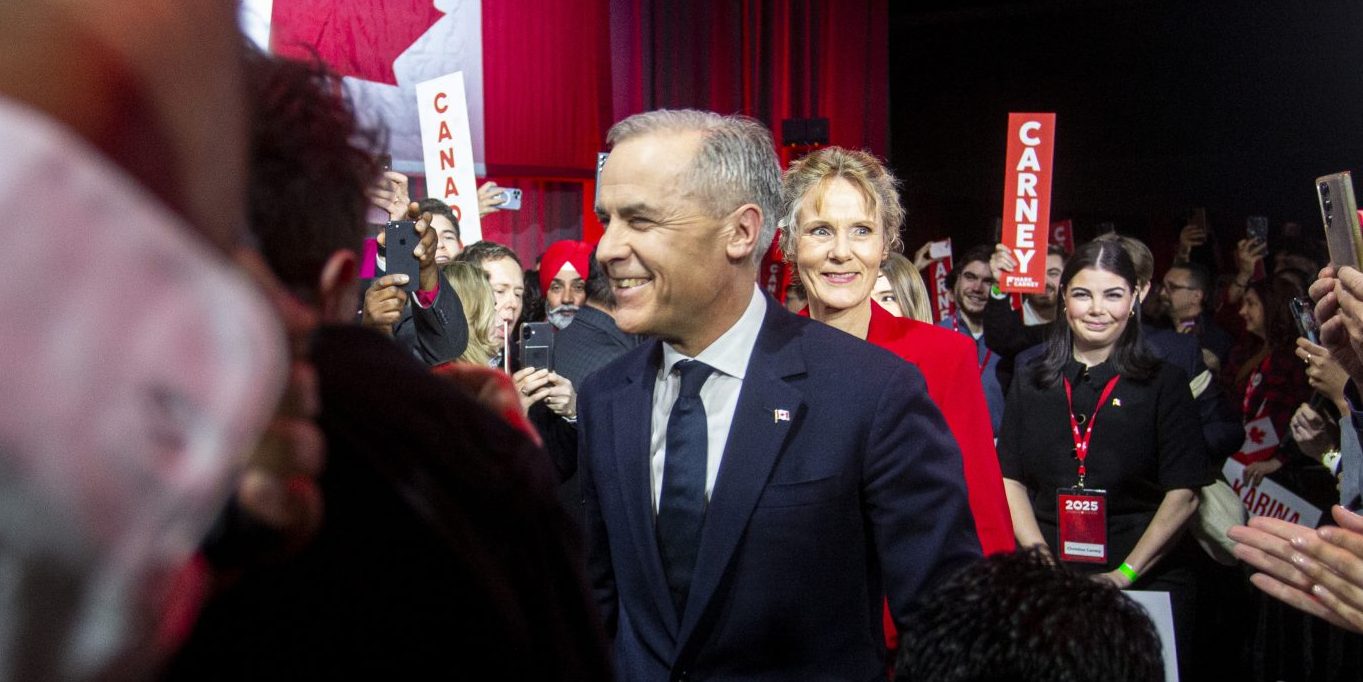
The Liberal Party united behind former central banker Mark Carney on Sunday as he ascended to leadership with the overwhelming support of the membership on the first ballot.
In his first address as Liberal leader after taking 85.9 per cent of the votes, Carney promised “big change,” with a strong emphasis on fortifying Canada’s economy.
The campaign-style speech outlined Carney’s vision for a renewed Liberal Party, and addressed Canada’s fight ahead with the United States in the face of a trade war while attacking the Conservatives as unfit for the challenge.
“It won’t be business as usual. We will have to do things we haven’t imagined before at speeds we didn’t think possible,” he told the more than 2,500 excited Liberals gathered at Rogers Centre Ottawa for the March 9 announcement.
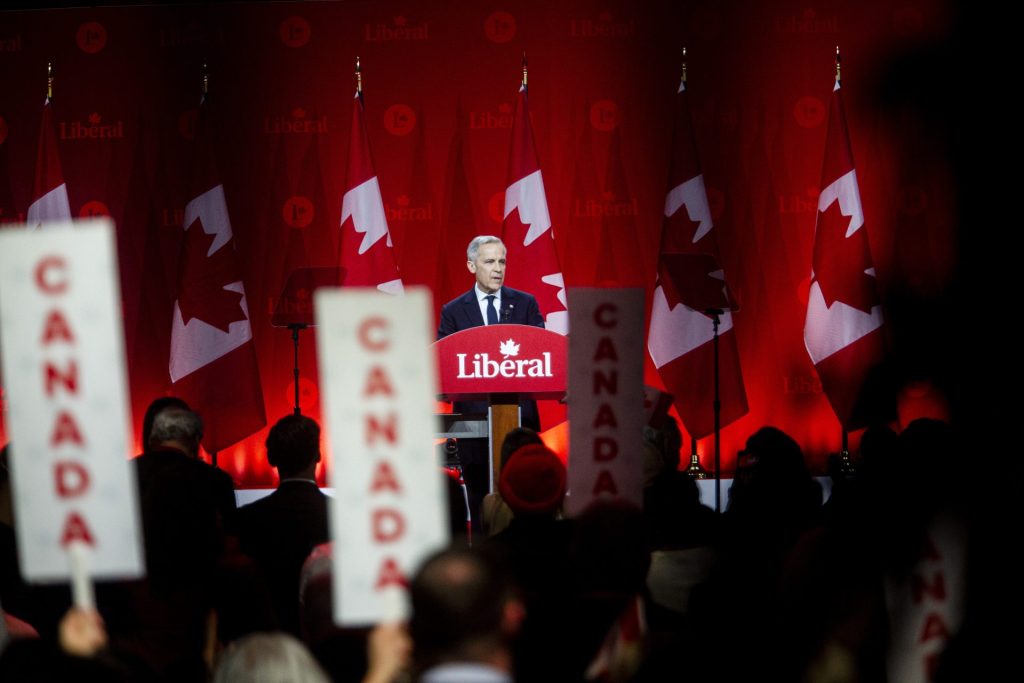
Carney, the former governor of the Bank of Canada and Bank of England, will now succeed Justin Trudeau (Papineau, Que.) as prime minister. The other candidates trailed him by huge margins: former deputy prime minister Chrystia Freeland (University Rosedale, Ont.) placed second with eight per cent, followed by former government House leader Karina Gould (Burlington, Ont.) with 3.2 per cent, and former Liberal MP and businessman Frank Baylis in fourth with three per cent. The party said that 151,899 votes were cast by the 3 p.m. deadline, out of 163,836 members who had successfully verified their identity.
Carney’s lead as the presumed favourite solidified early in the race, accumulating the overwhelming majority of caucus and cabinet endorsements and massive fundraising totals that dwarfed the remaining competitors combined.
During the leadership race, Carney’s team said he raised an impressive $4.5-million in just 10 weeks. According to Elections Canada data released on Friday, Freeland, Gould, and Baylis each secured approximately $360,000 in campaign contributions. However, campaign representatives have said that these figures are outdated by about a week and do not fully reflect the most recent totals, or the $350,000 required to enter the race.
Carney talks Trump, Poilievre in victory speech
In his victory speech, Carney described himself as a pragmatist, saying that he is willing to adapt if something does not work. As prime minister, he pledged to eliminate the carbon tax and the capital gains tax. He asserted that Canada did not initiate the trade war—the Americans did—but vowed that Canada would emerge victorious. He also stated that, under his leadership, tariffs would continue on American goods until the United States demonstrates respect for Canada.
“The Canadian government has rightly retaliated, and is rightly retaliating with our own tariffs that will have maximum impact in the United States and minimum impact here in Canada,” said Carney. “My government will keep our tariffs on until the Americans show us respect.”
He said that U.S. President Donald Trump wants to annex Canada and he would not let it happen.
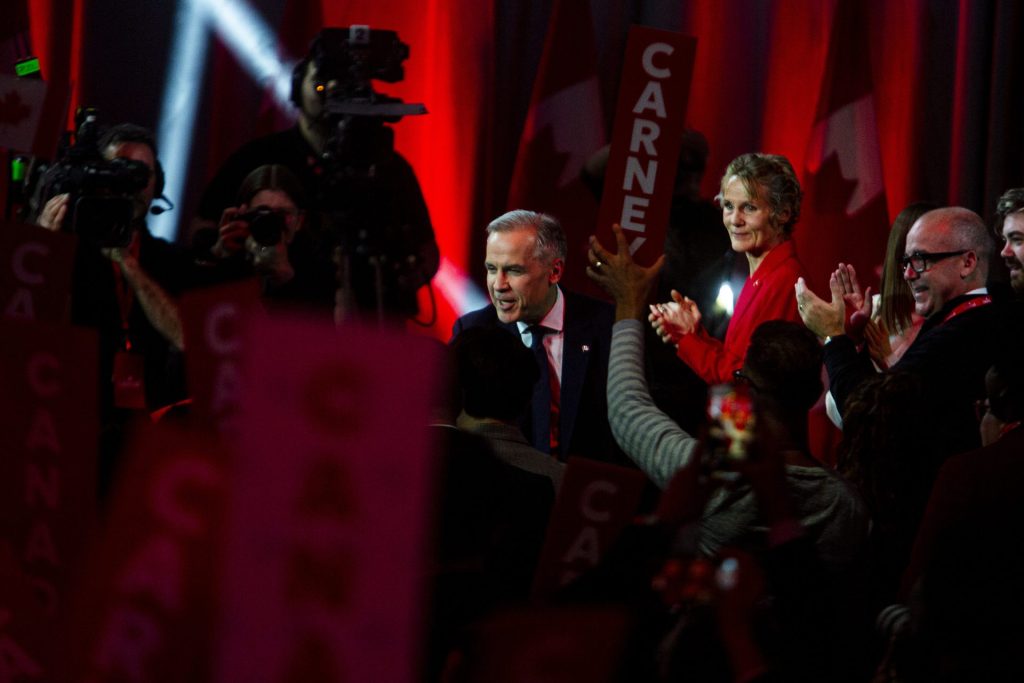
“We didn’t ask for this fight, but Canadians are always ready when someone else drops the gloves. So the Americans, they should make no mistake: in trade, as in hockey, Canada will win.”
He also took a shot at Conservative Party Leader Pierre Poilievre (Carleton, Ont.), calling him a “career politician” and blasted him for refusing to obtain his security clearance despite the country facing national security threats.
“He is the type of lifelong politician … who worships at the altar of the free market despite never having made a payroll himself,” said Carney.
“As a person [Poilievre] who worships at the altar of Donald Trump will kneel before him, not stand up to him.”
Despite running a predictable front-runner campaign, keeping his availability and questions from the media to a minimum, he did offer a few hints at what his platform would be.
In his acceptance speech, Carney repeated his promise to end the “divisive” consumer carbon price and cancel the planned capital gains tax increase. He has also previously suggested the federal budget be split into separate operating and capital budgets, and pledged to meet Canada’s two per cent NATO-spending commitment by 2027.
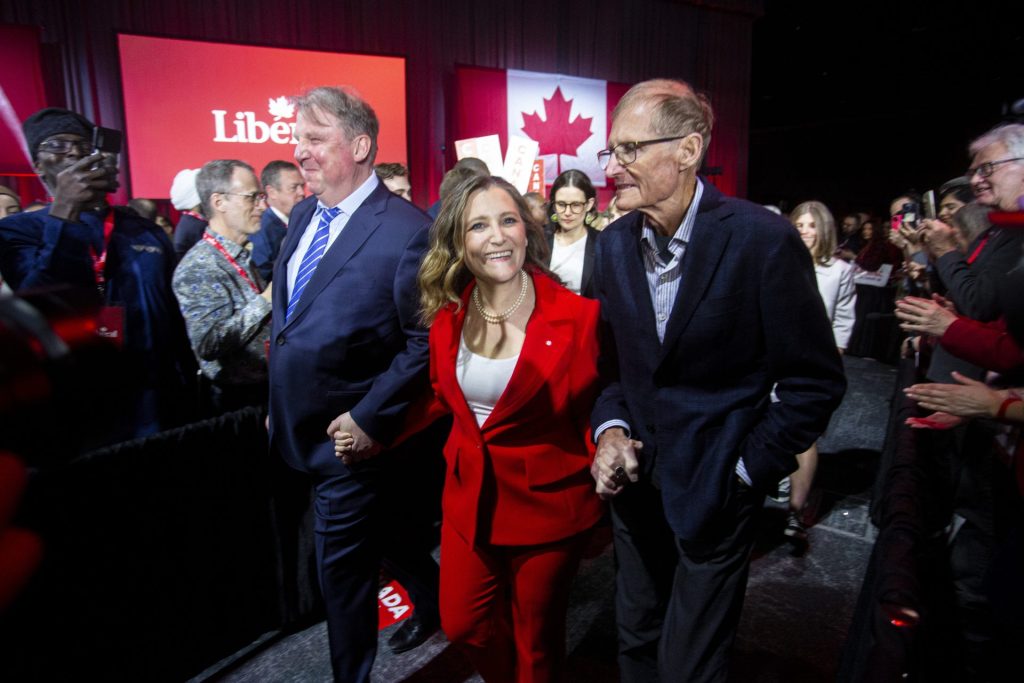
Trudeau makes final speech as Liberal leader
A source close to the organizers said more than 2,500 people gathered at the sold out event, hosted in the same Rogers Centre Ottawa venue where Liberals celebrated their annual Christmas party just over two months ago.
However, unlike that party—where attendees were haunted by the spectre of a 20-point polling deficit and a recently resigned deputy prime minister and disastrous fall economic statement—the smiles and excitement was palpable .
In his final speech as leader of the party, Trudeau kept the energy and enthusiasm high, but he appeared emotional, with tears in his eyes.
“As Canadians face, from our neighbour, an existential crisis, [we] are showing exactly what we are made of… not by pointing out what we are not but by proudly embracing who we are,” Trudeau told a cheering crowd.
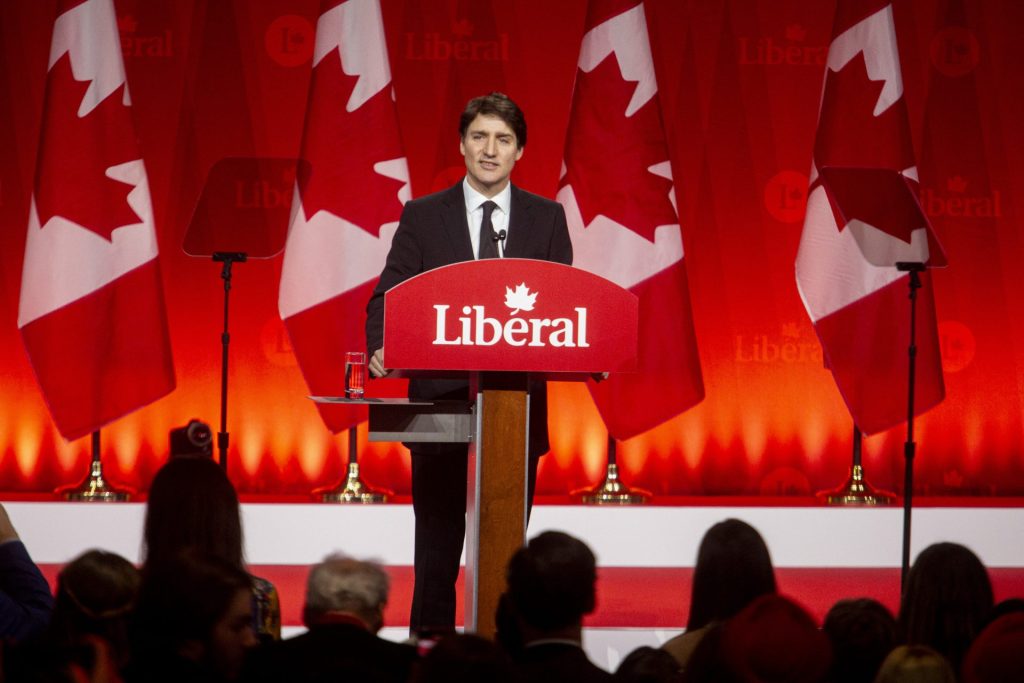
“We’re diplomatic when we can, but we fight when we must, and when we do, we do so elbows up,” said Trudeau, as Liberals chanted the last two words back at him. “When you try to count us out, that’s when we Liberals show our true mettle.”
Trudeau thanked the assembled Liberals for their support, which he said would be necessary as the country faces a political climate that presents a “nation-defining” moment.
“Democracy…freedom is not a given and none of these things happen by accident and none of them will continue without our effort,” Trudeau continued, adding that it would take all of their courage, hope and hard work. “We will meet this moment!”
The transition timeline for Carney’s leadership remains unclear. In a media scrum last week, Trudeau stated that those plans, including the day he will officially step down, would be finalized following discussions with the new Liberal leader “in the coming days, or week.”
Speaking with The Hill Times, former justice minister David Lametti, a key Carney supporter, said the new leader is ready for the transition “immediately,” suggesting it could begin as quickly as the following day.
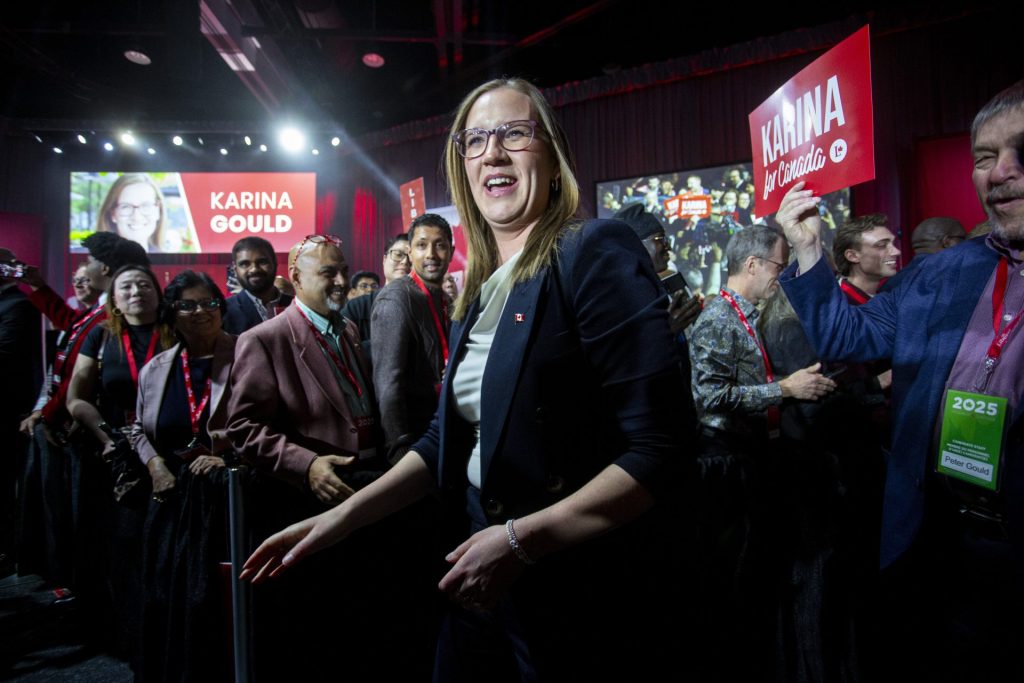
The leadership race began in early January after Trudeau announced plans to step down after months of internal pressure. Over the two-and-a-half-month campaign, the contest remained respectful, with no candidates engaging in negative attacks against the others. When the contest started, the Liberals were trailing the Conservatives by over 20 points in national public opinion polls. But, since Trudeau announced his upcoming exit amid Trump’s inauguration and heightened trade tensions with Canada, the Liberals have gained significant momentum. According to a recent poll, they are now leading Poilievre’s Conservatives by five points.
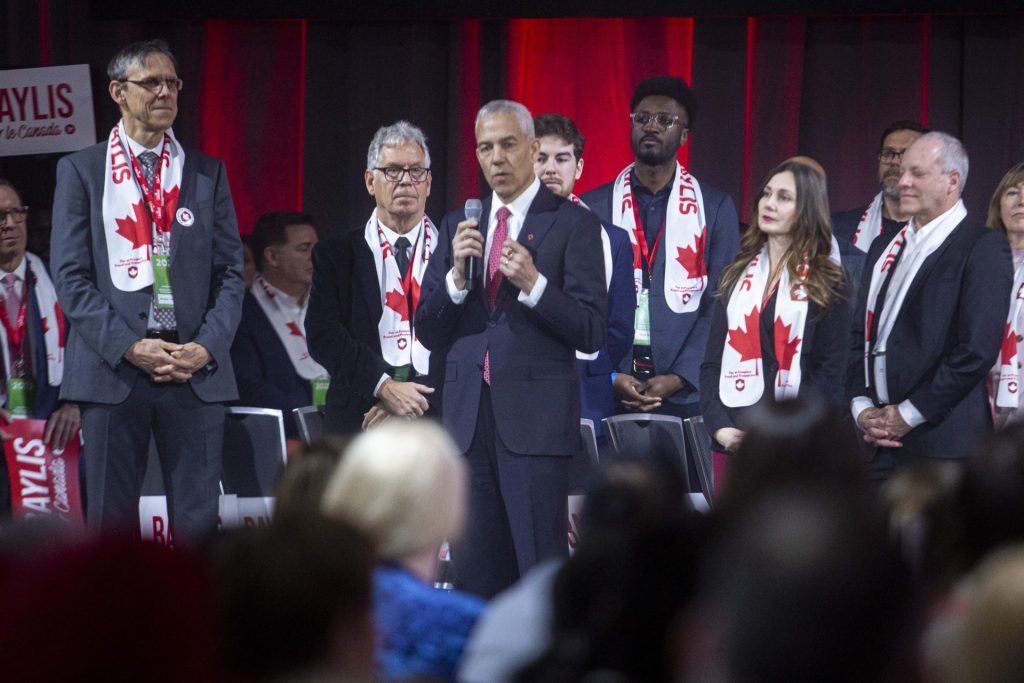
Party is ‘rallying’ says MP Battiste
An Ekos poll released last week suggested that if an election were held today, the Liberals would secure a majority government. The rolling poll, conducted between Feb. 27 and March 5, with a sample of approximately 2,000 respondents, showed the Liberals at 40.7 per cent support, followed by the Conservatives at 35.5 per cent, the NDP at 12.8 per cent, and the Greens at 3.2 per cent.
In the leadership election, each riding carried an equal weight of 100 points, with contestants securing points based on their percentage of the vote in that riding. The winning candidate needed at least 17,151 points—50 per cent plus one—to win. The vote was conducted across 343 newly reconfigured ridings, an increase from the previous 338. Party members used a ranked ballot system, ordering the four candidates by preference. If no candidate had secured a majority on the first ballot, the lowest-ranked candidate would be eliminated and their votes redistributed to the remaining contenders. This process would continue until a candidate achieved a majority.
Voters, whose eligibility was limited to Canadians and permanent residents, complained about verification issues in the lead-up to the March 9 results. Registered Liberals were given an electronic voter ID, which they then had to verify online, including confirming their status as an eligible voter. The party also required they confirm their identity using a Canada Post application, or at a participating office.
Liberal MP Jaime Battiste (Sydney—Victoria, N.S.), who bowed out of the leadership contest at the end of January, said the race had injected “new life” into the party.
As an Indigenous person, Battiste said he would be sad to see Trudeau depart but is excited by the prospect of a new party led by a new leader facing a different political landscape.
“We’re at a spot where people are more excited and looking at a new Canada and party than we had two months ago,” Battiste said. “We’re seeing our party rallying and I think it’s a celebration of how well the leadership process went.”
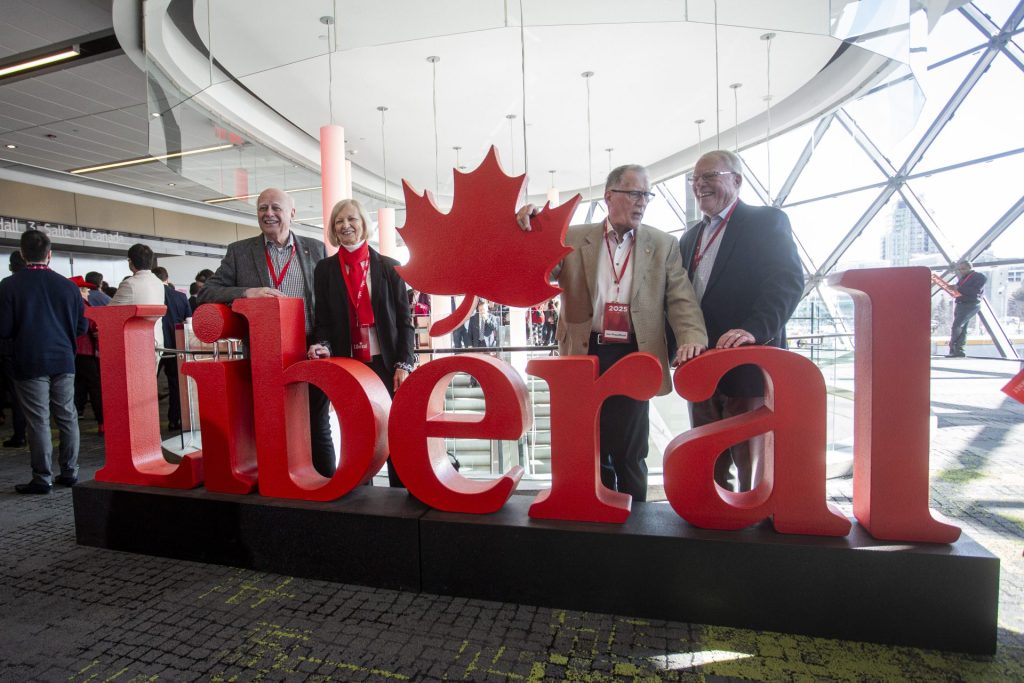
Battiste said that he and the other candidates who threw their hats in the ring in January all understood that they were not adversaries, but candidates in a shared fight against both the Conservatives and U.S. President Donald Trump, and “all of the other right-wing governments that are trying to divide us.”
Liberal MP Salma Zahid (Scarborough Centre, Ont.) who endorsed Carney for the leadership election, said that given the economic challenges posed by Trump’s tariffs, the former central banker is the ideal leader for both the Liberal Party and Canada.
“Canada needs a person with a strong economic background, and Mark Carney has that background, and I’m very hopeful that he will be able to pull us in the right direction,” said Zahid. “And he’s the person who can stand up to Donald Trump right now. The biggest threat for the Canadians, and on everyone’s mind, is the tariffs.”
Liberal sources told The Hill Times that the next election is expected to be called before the House returns back on March 24. The Hill Times previously reported that MPs and party officials are looking at March 16 or March 23 as the possible dates when the writ could be dropped. Liberal sources said that the final decision will be made in the coming days.
Top party officials will meet with Carney Monday morning to brief him on the party’s election readiness, and receive his input on the senior election team. Liberal sources told The Hill Times that the party has put together a team of 200 staffers and others that will be part of the national campaign team, including the war room.
The Hill Times





 LICENSING
LICENSING PODCAST
PODCAST ALERTS
ALERTS













